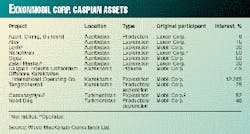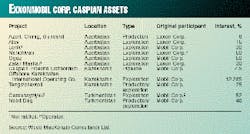ExxonMobil's Japanese affiliates to merge
Japan's General Sekiyu KK and Tonen Corp.-both affiliates of ExxonMobil Corp.-have agreed to merge in a bid to streamline operations and cut costs.
General Sekiyu will be the surviving entity, while Tonen will be dissolved. The new company will be called Tonen General Sekiyu KK.
Ahead of the merger, General Sekiyu plans to reduce its capital to allow an equal-basis merger.
General Sekiyu, a refiner and products wholesaler, is 50.1% owned by ExxonMobil. Refiner Tonen is a 51%-controlled consolidated unit of the US megamajor. Exxon and Mobil had each held about a 25% stake in Tonen since 1961, when Standard Vacuum split into Esso Eastern and Mobil Petroleum.
The merged company aims to rack up unconsolidated sales of ¥1.128 trillion/year, with an unconsolidated pretax or recurring profit of ¥54.5 billion and net profit of ¥35.5 billion for the year ending Dec. 31, 2001. On a consolidated basis, it aims to generate a net profit of ¥28.7 billion in 2001.
ExxonMobil aims to cut costs in Japan by ¥12 billion/year, primarily through a 20% reduction in its workforce to 3,000. Tonen will save ¥1.6 billion by cutting 100 of its workers, while General Sekiyu will earn ¥2.9 billion from reducing its workforce by 180.
Moody's Investors Service's Tokyo office issued a statement saying it was changing its outlook for General Sekiyu's Baa1 issuer rating to positive from stable: "The outlook change reflects Moody's expectation that the merger between [General Sekiyu] and Tonen could enhance the competitive position of its core products in the Japanese refined oil market."
The ratings firm predicted a major restructuring move in Japan's downstream sector last November. "The recent high crude oil prices have heightened the degree of the industry's inherent problems, such as overcapacity and excessive price competition, and a dramatic restructuring of the industry will continue to take place over the next several years," Moody's said.
Shared services
Meanwhile, refiner Kyokuto Petroleum Industries Ltd-owned 50% by Mobil Sekiyu-has yet to decide on what kind of alliance it will form with the other four Japanese subsidiaries of ExxonMobil. It is widely expected that KPI will sign the mutual services agreement (MSA) with the four firms to cut operational costs by sharing overlapping resources.
Under the MSA, the firms would supply their services to each other by sharing workers, facilities, and systems in key sectors such as distribution, supply, and refining.
ExxonMobil's group of Japanese affiliates is much smaller in size than Nippon Mitsubishi Oil Corp.'s combined affiliates. In 1998, the ExxonMobil affiliates had a combined 18% share in Japanese product sales and a 17% share of total domestic refining capacity. However, most of its companies have restructured ahead of their rivals and are highly cost-competitive; thus, the group will probably become even stronger, in terms of cost, as it continues to reorganize.
In an attempt to boost its own competative edge, Nippon Mitsubishi Oil has announced that it will become Teikoku Oil Co.'s major shareholder, with a 16.47% stake. The two companies will cooperate in oil and natural gas exploration. Nippon Mitsubishi Oil currently has a 3.9% stake in Teikoku Oil.

